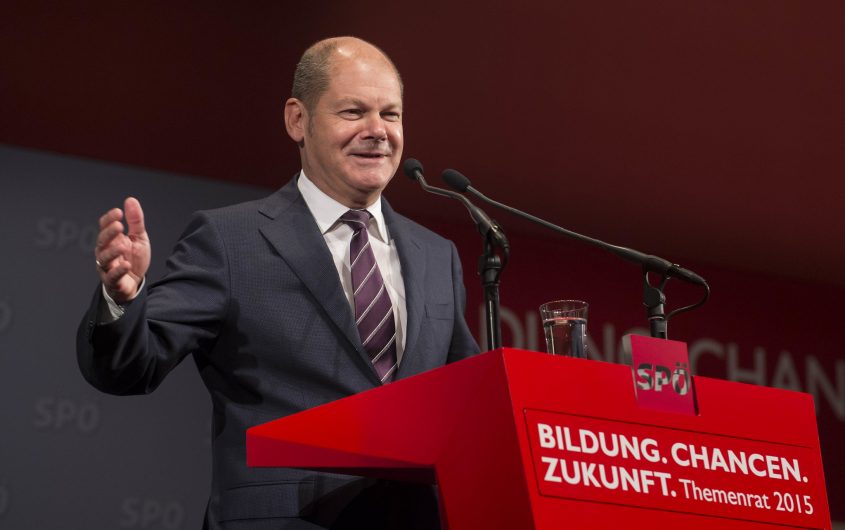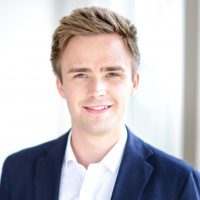
SPÖ / Thomas Jantzen via Flickr
The SPD Goes Back to the Future

Julian Mueller-Kaler
Stimson Center
Julian Mueller-Kaler is the Director of the Strategic Foresight Hub in the Executive Office at the Stimson Center and also serves as Chief of Staff to the President and CEO. He coordinates and manages special projects, advises on strategy, and supports institutional advancement. As director of the Hub, he researches global trends, evaluates the implications of emerging technologies on society and politics, and writes about the rise of populism, US-China relations, and the future of the liberal international order.
Before joining Stimson, Mueller-Kaler was a resident senior fellow with the Atlantic Council GeoTech Center and the Scowcroft Strategy Initiative where he worked on the geopolitics of technology and lead the GeoTech Center’s AI Connect program – a joint work stream with the U.S. Department of State that encouraged the responsible stewardship of AI technologies in the Global South. He also serves as a non-resident fellow at the American-German Institute, is an associate fellow at German Council on Foreign Relations (DGAP) in Berlin, and previously consulted in the office of the German Executive Director at the World Bank Group. Mueller-Kaler graduated as a Fulbright-Schuman scholar (MA) from Georgetown University’s School of Foreign Service and holds a degree in International Relations (BA) from Zeppelin University in southern Germany.
He was a 2017-2018 participant in AICGS’ project "A German-American Dialogue of the Next Generation: Global Responsibility, Joint Engagement," sponsored by the Transatlantik-Programm der Bundesrepublik Deutschland aus Mitteln des European Recovery Program (ERP) des Bundesministeriums für Wirtschaft und Energie (BMWi).
German politics today is fit for a Greek tragedy, which is particularly true for the Social Democratic Party (SPD). The quest for new leadership less than a year ago brought to power two unexperienced political light-weights who served no other purpose than to impersonate a radical break with the party’s past. Saskia Esken and Norbert Walter-Borjans neither knew the political spotlight, nor were they part of the Berlin establishment, which at the time, served as a badge of honor. With a pandemic in the interim, when it came to the decision of who will be leading the party into the upcoming election next year, that leadership duo chose the very man who lost against them: the current finance minister and vice chancellor, Olaf Scholz. It’s a move that is interesting for a variety of reasons.
First, it exemplifies the revival of the political establishment. While populist parties in contemporary Germany have never been as successful as their counterparts in other Western democracies, the anti-establishment temptation also carried a certain weight in the Federal Republic. Whether it was the Alternative for Germany (AfD) that thrived on a strict anti-Merkel sentiment or the Green Party receiving support from many well-educated young people who were fed up with the never-ending story of grand coalitions, both benefited from a public fatigue with the status quo. However, times have changed and populist rhetoric has lost significant support over the last couple of months. It turns out that existing government structures, a functioning bureaucracy, and a certain level of political experience does actually serve a country well in the midst of a global health and economic crisis. For many Germans, a view across the pond makes this realization even clearer. After all, nothing exposes the incompetence of right-wing populists more than a proper crisis.
Times have changed and populist rhetoric has lost significant support over the last couple of months.
Finance minister Olaf Scholz, who somewhat serves as Merkel’s right hand during the crisis, was essential in the government’s response to COVID-19. His approach of using the financial “bazooka” right from the beginning helped mitigate the economic consequences, kept unemployment at an acceptable rate, and guaranteed that the German economy would not collapse entirely. Many of the instruments utilized elucidated the benefits of having a social market economy, one guarded by government regulations and lasting social contracts between companies and their employees. The only problem with that, however, is the tragic admission that most of the public’s approval is captured by Chancellor Merkel and her conservative party, while the SPD is stuck with levels of support far below 20 percent—the worst it has ever been in the long history of the proud party. These circumstances illuminate the second reason why Olaf Scholz pursuing the chancellery is interesting.
After more than one and a half decades in the driver seat, Angela Merkel is not running for reelection. This veritable political earthquake not only ignited an internal fight over her succession, but a deep debate about the future of the conservative party itself. With Merkel no longer on the ballot, the Social Democrats are pursuing a strategy of “no adventures,” presenting a candidate that has proven to be a responsible, trustworthy, and reliable leader and, some would argue, might as well be seen as her natural successor irrespective of party affiliation. Even if the true success of this promising gambit will heavily depend on Scholz’s conservative competitor, it remains a political gamble nevertheless.
With Merkel no longer on the ballot, the Social Democrats are pursuing a strategy of “no adventures,” presenting a candidate that has proven to be a responsible, trustworthy, and reliable leader and, some would argue, might as well be seen as her natural successor irrespective of party affiliation.
After taking a serious hit in her approval ratings during the migration crisis, Merkel is again one the most popular politicians in Germany, roughly among the same levels as the current Bavarian minister-president Markus Söder, who is said to have political ambitions for the chancellery himself (despite public denials). It is hard to imagine that many of these voters will, all of a sudden, change their party preferences and come to support the SPD in the upcoming elections.
Also of interest is the fact that Olaf Scholz does not necessarily belong to the left wing of his own party. He was general secretary under former chancellor Gerhard Schröder, who many blame for today’s Social Democratic misery. The former chancellor’s comprehensive reform agenda, also known as the Agenda 2010, continues to feel like a betrayal of the party’s traditional convictions and might as well have been the reason why Scholz was not elected party leader last year. The ones who celebrated his loss back then are the ones who now embrace the left-wing agenda of today’s SPD.
The subsequent question then, is how much divergence is acceptable and, more importantly, believable between a party and its candidate? The ghosts of the past are howling again through the floors of the Willy Brandt Haus, the SPD’s headquarters in Berlin, and if previous election campaigns are any indication, it did not really serve the party well having a relatively moderate candidate trying to sell a left-wing program.
Power relations in Germany are shifting fundamentally and conventional wisdom might not hold true anymore.
Power relations in Germany, however, are shifting fundamentally and conventional wisdom might not hold true anymore. With new alliances being created, unknown ways to power are paved. The Greens in particular, once a party operating on the sidelines, have managed to continuously poll ahead of the SPD. Its leaders make no secret of wanting to take responsibility as soon as possible, which leaves the door wide open for a novum in federal German politics, namely a conservative-green government. The only way to stop this might be a super-left alliance, consisting of not just the Greens and the Social Democrats, but also the Left Party—without a doubt an uphill battle that would require a lot of political compromise. Furthermore, the only way to convince the Greens of not forming a coalition with the conservative party might be to have them take the chancellery themselves, which would leave Olaf Scholz out in the open. All told, these are indeed circumstances fit for a Greek tragedy.








